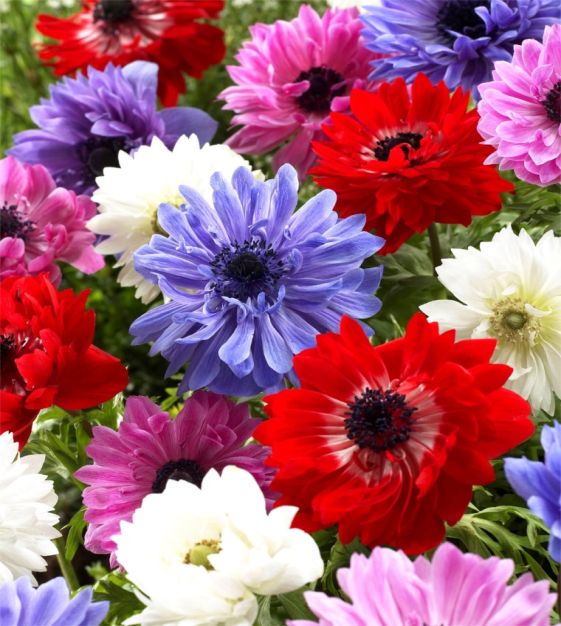-
- 20%-Off Website Specials
- New for 2024!
- Tulips
- Narcissi
- Allium
- Anemone blanda
- Brodiaea
- Camassia
- Chionodoxa
- Corydalis
- Crocus
- Eranthis
- Eremurus
- Erythronium
- Fritillaria
- Galanthus
- Geranium
- Gladiolus
- Hyacinths
- Hyacinthoides
- Ipheion uniflorum
- Dutch Iris
- Rock Garden Iris
- Ixiolirion
- Leucojum Aestivum
- Muscari
- Ornithogalum
- Oxalis
- Puschkinia
- Scilla
- Lilies
- Peonies
- Tender Bulbs
- Anemone Giants
- Tecolote Ranunculus
- Freesias
- Paperwhites
- Amaryllis
The Anemone Giant St Brigid Double Mixture
Double, mix of colors.
Anemone coronaria. Anemone Giants are long-lasting cut and display flowers growing 12" to 15" tall. The tender corms may be fall-planted outdoors in HZ 8-10 (mulch is a must in HZ 8). In HZ 3-7, hold the corms over the winter in 60°F, dry conditions and plant them outdoors after any threat of spring frost has passed.
Immediately prior to planting, soak the knobby, wizened corms for 2 hours or overnight in room temperature water to promote faster sprouting and root development. Plant the corms 4" to 5" deep and 3" apart in full to partial sunlight and well-draining soil. Don't worry about which end is up: they'll grow toward the sun. Allow the foliage to die back naturally. (In HZ 3-7, lift the corms and store for the winter, or discard. In HZ 8-10, the bulbs will go dormant for several months followed by the next growth cycle.)
Anemone Giants are terrific grown indoors in cool, bright greenhouse conditions without precooling. After soaking, pot the corms closely together, covered with 2" of sterile potting soil in well-draining pots. Place them in a 55° to 60°F greenhouse in light shade until the sprouts are 2" tall, then shift the pots into bright greenhouse sunlight. Lack of flowers or malformed flowers result from too little sunlight and/or too much heat. They flower in 16 weeks or so once potted. Corm size: 8 cm/up.
Anemone coronaria. Anemone Giants are long-lasting cut and display flowers growing 12" to 15" tall. The tender corms may be fall-planted outdoors in HZ 8-10 (mulch is a must in HZ 8). In HZ 3-7, hold the corms over the winter in 60°F, dry conditions and plant them outdoors after any threat of spring frost has passed.
Immediately prior to planting, soak the knobby, wizened corms for 2 hours or overnight in room temperature water to promote faster sprouting and root development. Plant the corms 4" to 5" deep and 3" apart in full to partial sunlight and well-draining soil. Don't worry about which end is up: they'll grow toward the sun. Allow the foliage to die back naturally. (In HZ 3-7, lift the corms and store for the winter, or discard. In HZ 8-10, the bulbs will go dormant for several months followed by the next growth cycle.)
Anemone Giants are terrific grown indoors in cool, bright greenhouse conditions without precooling. After soaking, pot the corms closely together, covered with 2" of sterile potting soil in well-draining pots. Place them in a 55° to 60°F greenhouse in light shade until the sprouts are 2" tall, then shift the pots into bright greenhouse sunlight. Lack of flowers or malformed flowers result from too little sunlight and/or too much heat. They flower in 16 weeks or so once potted. Corm size: 8 cm/up.
- Information
Anemone Giants
Anemone coronaria. Anemone Giants are long-lasting cut and display flowers growing 12" to 15" tall. The tender corms may be fall-planted outdoors in HZ 8-10 (mulch is a must in HZ 8). In HZ 3-7, hold the corms over the winter in 60°F, dry conditions and plant them outdoors after any threat of spring frost has passed.
Immediately prior to planting, soak the knobby, wizened corms for 2 hours or overnight in room temperature water to promote faster sprouting and root development. Plant the corms 4" to 5" deep and 3" apart in full to partial sunlight and well-draining soil. Don't worry about which end is up: they'll grow toward the sun. Allow the foliage to die back naturally. (In HZ 3-7, lift the corms and store for the winter, or discard. In HZ 8-10, the bulbs will go dormant for several months followed by the next growth cycle.)
Anemone Giants are terrific grown indoors in cool, bright greenhouse conditions without precooling. After soaking, pot the corms closely together, covered with 2" of sterile potting soil in well-draining pots. Place them in a 55° to 60°F greenhouse in light shade until the sprouts are 2" tall, then shift the pots into bright greenhouse sunlight. Lack of flowers or malformed flowers result from too little sunlight and/or too much heat. They flower in 16 weeks or so once potted. Corm size: 8 cm/up. Pricing per individual selection:
Anemone Giants
Anemone coronaria. Anemone Giants are long-lasting cut and display flowers growing 12" to 15" tall. The tender corms may be fall-planted outdoors in HZ 8-10 (mulch is a must in HZ 8). In HZ 3-7, hold the corms over the winter in 60°F, dry conditions and plant them outdoors after any threat of spring frost has passed.
Immediately prior to planting, soak the knobby, wizened corms for 2 hours or overnight in room temperature water to promote faster sprouting and root development. Plant the corms 4" to 5" deep and 3" apart in full to partial sunlight and well-draining soil. Don't worry about which end is up: they'll grow toward the sun. Allow the foliage to die back naturally. (In HZ 3-7, lift the corms and store for the winter, or discard. In HZ 8-10, the bulbs will go dormant for several months followed by the next growth cycle.)
Anemone Giants are terrific grown indoors in cool, bright greenhouse conditions without precooling. After soaking, pot the corms closely together, covered with 2" of sterile potting soil in well-draining pots. Place them in a 55° to 60°F greenhouse in light shade until the sprouts are 2" tall, then shift the pots into bright greenhouse sunlight. Lack of flowers or malformed flowers result from too little sunlight and/or too much heat. They flower in 16 weeks or so once potted. Corm size: 8 cm/up. Pricing per individual selection:





